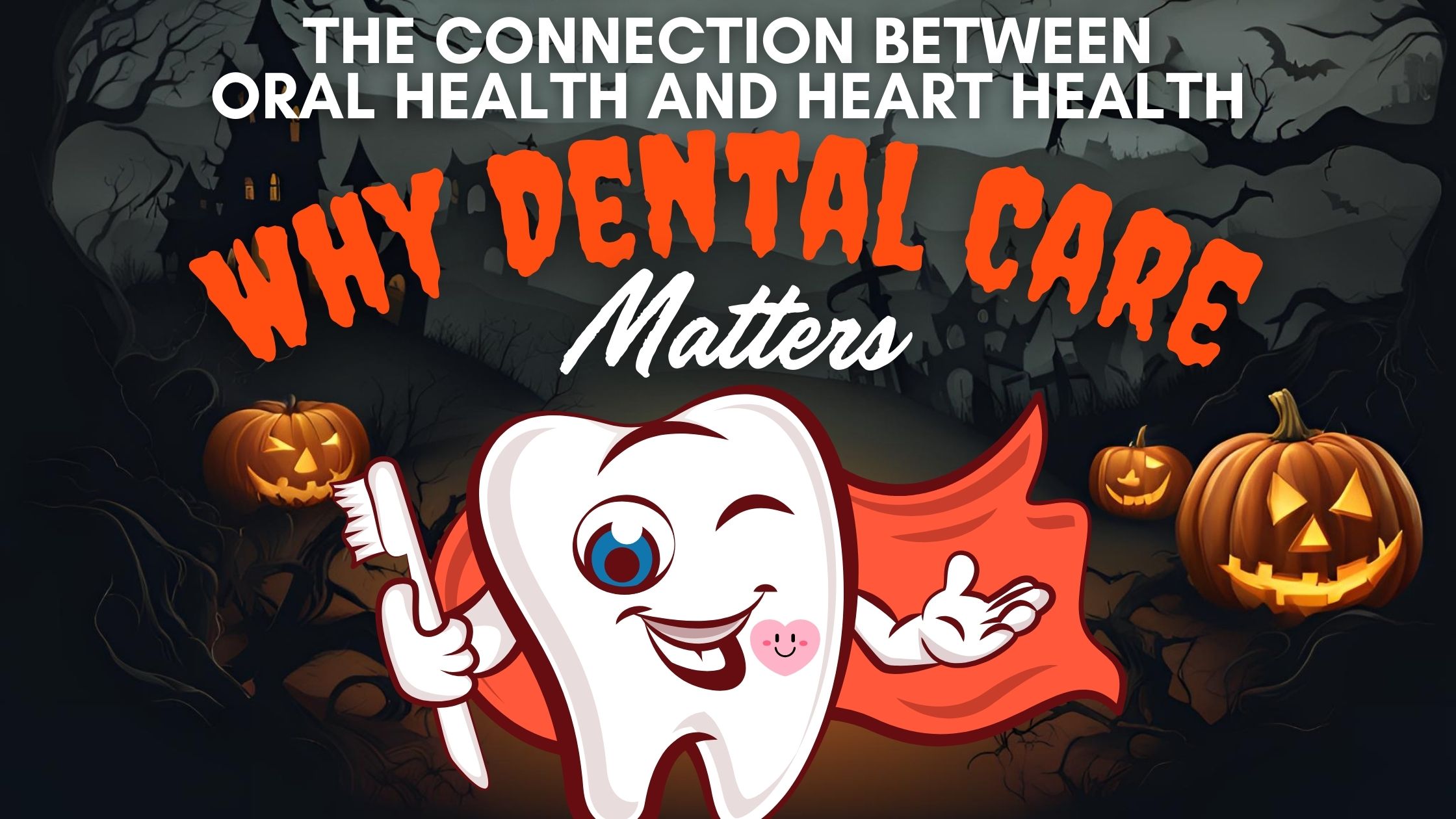The Connection Between Oral Health And Heart Health:

Why Dental Care Matters
As Halloween approaches, our thoughts often turn to candy, creepy costumes, and spine-chilling movies. While these seasonal treats and thrills are all good fun, there’s a real scare that accompanies every bite-sized chocolate bar: the connection between poor dental health and heart disease. Sugary sweets and spooky films might give us a fright, but neglecting our oral hygiene can have serious consequences for our cardiovascular well-being. As we dive into the festivities, it’s crucial to remember that maintaining good dental care is not just about preventing cavities and gum disease—it’s also a key component in protecting our heart health.
Dental care and heart health are more interconnected than many people realize. Research has consistently shown that individuals with poor oral health face a higher risk of cardiovascular problems compared to those who maintain good oral hygiene. This link may be influenced by shared risk factors such as smoking and poor diet. While not everyone with gum disease will develop heart issues, oral infections can introduce significant health risks that potentially affect cardiovascular well-being. Understanding this connection underscores the importance of good dental care in supporting overall heart health.
Poor oral hygiene can lead to a range of health issues. Gum disease and tooth loss may affect your ability to chew food properly, potentially leading to poor dietary choices that contribute to obesity, high blood pressure, and diabetes. Additionally, the stress and anxiety caused by these dental problems can be further exacerbated by other risk factors for heart disease.
Periodontal disease, also known as gum disease, involves inflammation or infection in the tissues surrounding your teeth. Symptoms of gum disease include red or purple gums, bleeding, soreness, bad breath, pain, gum recession, and loose teeth. Typically gum disease starts with a build up of plaque and progresses to gingivitis and, if left untreated, becomes mild to advanced periodontitis.
Inflamed or infected gums can allow inflammatory substances to enter the bloodstream, causing widespread inflammation throughout the body. Systemic inflammation is a known risk factor for cardiovascular diseases such as atherosclerosis, where plaque builds up in the arteries. This plaque buildup can harden the arteries, reducing blood flow and increasing the risk of heart attacks, strokes, and coronary artery disease.
Even more alarming is the potential for bacteria to reach the heart. Endocarditis is an infection of the inner lining of the heart chambers and valves, often caused by bacteria entering the bloodstream from the mouth. These bacteria can grow on the heart valves and, if left untreated, can become fatal. People with certain heart conditions are at higher risk for endocarditis, making good dental care particularly important for these individuals. By maintaining good oral hygiene, you can help reduce gum inflammation and, by extension, lower systemic inflammation.
A balanced diet and regular exercise are well-known for promoting heart health, but proper oral hygiene is equally important for maintaining overall well-being. To incorporate good dental practices into your daily routine, consider the following:
- Brush Twice Daily: Use fluoride toothpaste and a soft-bristled toothbrush.
- Floss Daily: Remove plaque between teeth and under the gumline.
- Avoid Tobacco: Smoking and chewing tobacco can worsen gum disease and increase cardiovascular risk.
- Schedule Regular Dental Check-ups: Visit your dentist at least twice a year for cleanings and exams.
- Maintain a Healthy Diet: Eat a balanced diet rich in fruits, vegetables, and whole grains, and limit sugary and acidic foods.
By integrating these dental care habits into your routine, you’re not just taking care of your teeth and gums—you’re also contributing to your overall cardiovascular health. As we enjoy the Halloween season, let’s remember that the true horror isn’t in the haunted houses or eerie costumes, but in neglecting the simple steps that can safeguard our heart health. Prioritizing oral hygiene is a powerful way to protect both your smile and your heart, ensuring that your festivities are not overshadowed by preventable health issues. So this Halloween, enjoy your treats, but don’t forget to take care of your teeth—your heart will thank you.
Kotronia, Eftychia, et al. “Poor Oral Health and the Association with Diet Quality and Intake in Older People in Two Studies in the UK and USA.” The British Journal of Nutrition, vol. 126, no. 1, July 2021, pp. 118–30. PubMed Central, https://doi.org/10.1017/S0007114521000180.“Periodontal (Gum) Disease: How Serious Is It?” Cleveland Clinic, https://my.clevelandclinic.org/health/diseases/21482-gum-periodontal-disease. Accessed 3 Oct. 2024. “Heart Valves and Infective Endocarditis.” Www.Heart.Org, https://www.heart.org/en/health-topics/heart-valve-problems-and-disease/heart-valve-problems-and-causes/heart-valves-and-infective-endocarditis. Accessed 3 Oct. 2024. MD, Robert H. Shmerling. “Gum Disease and the Connection to Heart Disease.” Harvard Health, 13 Apr. 2018, https://www.health.harvard.edu/diseases-and-conditions/gum-disease-and-the-connection-to-heart-disease. Are Tooth Brushing Habits Tied to Heart Health? | Lifespan. https://www.lifespan.org/lifespan-living/are-tooth-brushing-habits-tied-heart-health. Accessed 3 Oct. 2024. “Hidden Tooth Infections Increase Heart Disease Risk by Almost 3 Times.” UPMC Western Maryland, 18 Feb. 2018, https://www.wmhs.com/hidden-tooth-infections-increase-heart-disease-risk-almost-three-times/. PC, Greg L. LaVecchia, DMD. “The Surprising Link Between Your Heart Health and Oral Health.” Greg LaVecchia, DMD, 17 Jan. 2024, https://www.rosslyndentist.com/post/heart-disease-oral-health. “Gum Disease and Heart Disease: The Common Thread.” Harvard Health, 1 Mar. 2018, https://www.health.harvard.edu/heart-health/gum-disease-and-heart-disease-the-common-thread.
